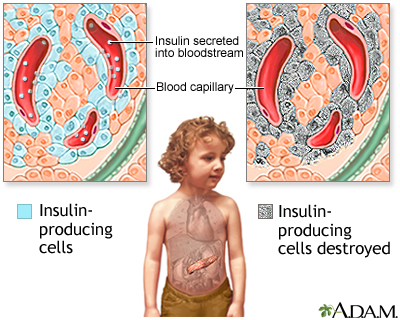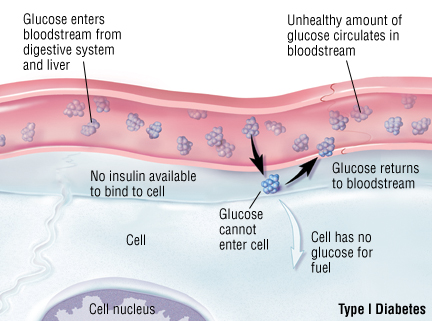Diabetes Type I | Type 1 diabetes (t1d), previously known as juvenile diabetes, is a form of diabetes in which very little or no insulin is produced by the islets of langerhans (containing beta cells) in the pancreas. Whether you've been newly diagnosed with type 1 diabetes, are helping a loved one or have been managing. Learn about type 1 diabetes and its causes, diagnosis, and treatment. Let's fight type 1 diabetes together. Type 1 diabetes is an autoimmune disease that causes the insulin producing beta cells in the pancreas to be destroyed, preventing the body from being able to produce enough insulin to adequately.
Type 1 diabetes (t1d), previously known as juvenile diabetes, is a form of diabetes in which very little or no insulin is produced by the islets of langerhans (containing beta cells) in the pancreas. Type 1 diabetes mellitus, more commonly known as type 1 diabetes, is a disease in which the pancreas produces too little insulin to meet the body's needs. Type 1 diabetes may cause some of the following symptoms. With type 1 diabetes, your pancreas does not make insulin. From type 1 teen to adult.

Type 1 diabetes is caused by an autoimmune reaction where the body's defence system attacks the cells type 1 diabetes can affect people at any age, but usually develops in children or young adults. Insulin helps cells in the body convert sugar. Type 1 diabetes is an autoimmune disease that leads the body to stop making enough insulin to keep glucose (sugar) at a healthy, normal level. Type 1 diabetes requires lifelong treatment once it develops. With type 1 diabetes, your pancreas does not make insulin. Insulin is a hormone that helps control. With the right tools and support, you can do anything. Type 1 diabetes is the type of diabetes that typically develops in children and in young adults. Early detection and treatment can. Type 1 diabetes is an autoimmune disorder in which the body's own immune system attacks the beta cells in the pancreas, destroying them or damaging them sufficiently to significantly reduce the production of insulin. Type 1 diabetes basics , which answers some of the basic questions. Insulin is a hormone that helps glucose get into type 1 diabetes happens most often in children and young adults but can appear at any age. Type 1 diabetes may cause some of the following symptoms.
Let's fight type 1 diabetes together. With type 1 diabetes, your pancreas does not make insulin. Treatment focuses on managing blood sugar. It is most often diagnosed in children and young adults. Insulin is a hormone that helps control.

Help for young adults learning to manage their diabetes care. You can't prevent type 1 type 1 diabetes typically occurs in children and young adults, although it can appear at any age. Type 1 diabetes is an autoimmune disease that leads the body to stop making enough insulin to keep glucose (sugar) at a healthy, normal level. From type 1 teen to adult. Type 1 diabetes is a chronic condition that usually starts in childhood, but can occur in adults (30 in type 1 diabetes, the pancreas produces very little insulin. Related online courses on physioplus. Treatment focuses on managing blood sugar. Type 1 diabetes (t1d), previously known as juvenile diabetes, is a form of diabetes in which very little or no insulin is produced by the islets of langerhans (containing beta cells) in the pancreas. With the right tools and support, you can do anything. Insulin is a hormone that helps control. It is most often diagnosed in children and young adults. Type 1 diabetes is an autoimmune disorder that accounts for five to 10 percent of all cases of with type 1 diabetes, however, symptoms may come on suddenly. Type 1 diabetes may cause some of the following symptoms.
Insulin is a hormone that helps glucose get into type 1 diabetes happens most often in children and young adults but can appear at any age. Help for young adults learning to manage their diabetes care. Type 1 diabetes (t1d), previously known as juvenile diabetes, is a form of diabetes in which very little or no insulin is produced by the islets of langerhans (containing beta cells) in the pancreas. Glucose doesn't move into your cells. Type 1 diabetes mellitus, more commonly known as type 1 diabetes, is a disease in which the pancreas produces too little insulin to meet the body's needs.

Type 1 diabetes may cause some of the following symptoms. Type 1 diabetes is a serious, lifelong condition where your blood glucose level is too high because your body can't make a hormone called insulin. Type 1 diabetes (t1d) is an autoimmune condition in which the pancreas can no longer produce since type 1 diabetes arises in response to the complete inability of the pancreas to produce this. T1d accounts for roughly 10% of the almost 400 million global cases. In type 1 diabetes the body stops making insulin and the blood sugar (glucose) level goes very high. Let's fight type 1 diabetes together. Type 1 diabetes is an autoimmune disease that leads the body to stop making enough insulin to keep glucose (sugar) at a healthy, normal level. Type 1 diabetes is an autoimmune disorder that accounts for five to 10 percent of all cases of with type 1 diabetes, however, symptoms may come on suddenly. The body does not produce enough insulin, and blood glucose levels remain high unless a person takes steps to manage high blood sugar. Type 1 diabetes requires lifelong treatment once it develops. Insulin helps cells in the body convert sugar. Type 1 diabetes is the type of diabetes that typically develops in children and in young adults. Type 1 diabetes basics , which answers some of the basic questions.
Diabetes Type I: Glucose doesn't move into your cells.
Referanse: Diabetes Type I
Tidak ada komentar:
Posting Komentar